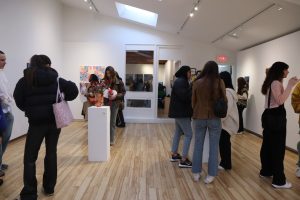Stories of Northern Ontario & “The Ashley Plays”
‘THE ASHLEY PLAYS’ PREMIERE THIS SUNDAY AT 1:00PM ON YOUTUBE — CLICK HERE TO SET A REMINDER
The Ashley Plays are a series of short, original site-specific monodramas written and performed by the playwrights in “THEA 4920: Playwriting & New Play Dramaturgy”. In collaboration with class dramaturgs and Course Director Judith Rudakoff, the playwrights create and evolve a play about a central character named “Ashley”. Each playwright has the artistic freedom to develop their own Ashley character and the playwrights are assigned a specific location (or site) in which their play takes place. Typically, the sites are located in the Centre for Film & Theatre, and on performance day, groups of audience members are led from site to site, to view the cycle of plays.
We spoke to Garrett Ryan, 4th year playwright, about The Ashley Plays, and his contributions.
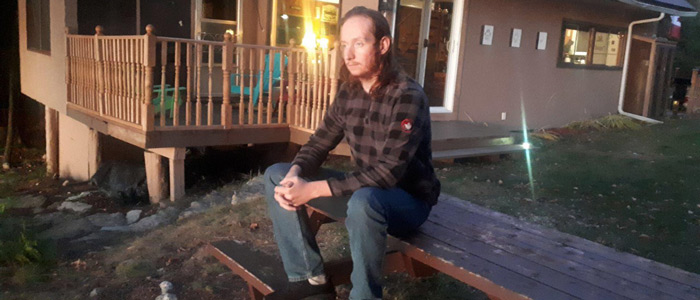
Garrett Ryan
AMPD: What makes this year different for The Ashley Plays?
GARRETT RYAN: This year, the pandemic necessitated moving the cycle online, and each playwright’s site is their bedroom. The cycle of cyber plays is set in March/April 2020. The plays are not about the pandemic, but rather they live in the pandemic, reflecting a world that is unlike anything we are used to experiencing. The Ashley Plays @ Home will premiere on the Theatre Department’s YouTube channel on Sunday October 25 at 1 pm and will continue to be available for viewing afterwards.
AMPD: How would you describe your monodrama?
GR: It’s about Micky Casey and Ashley Sweeny, two former boyhood friends from Northern Ontario, who have drifted apart for many years. After Ashley’s tragically young death, Micky finds himself speaking at the Zoom funeral, reliving the ways in which the two bonded over and healed from their shared childhood trauma. As Micky’s speech builds in intensity and switches into an accusatory tone, it becomes quickly apparent that he wishes to do more than simply share old memories.
AMPD: What made you choose Northern Ontario as a setting?
GR: I was born in North Bay, a small city in Northeastern Ontario, and was able to spend many of my formative years experiencing what Northern Ontario has to offer, from the larger centres of Sudbury and Sault Ste. Marie to the more rural communities of West Nippising and Cobalt. After leaving for University, I realized just how much of my theatrical heartbeat I drew from the area. Full of shrinking industrial towns and cities with growing issues of substance abuse, Northern Ontario has a wealth of pressing issues to be dealt with. However, at the same time, there exists a plethora of endlessly fascinating people from all walks of life, who draw their personalities from the harsh and beautiful rural environment. It is this combination of the Northern Ontarian environment and the Northern Ontarians themselves that keep pulling me back as a storyteller. In this particular monodrama, I latched onto both the ever-present drive among youths to “get out” of Northern Ontario and the suffocating feeling that comes with the inability to disappear in a sea of strangers, and considered how these negative experiences could be amplified in the context of abuse. While my monodrama is fictional, it is inspired from personal experiences and the experiences of people I hold dear to my heart, and deeply rooted in the fabric of the Northern Ontarian experience.
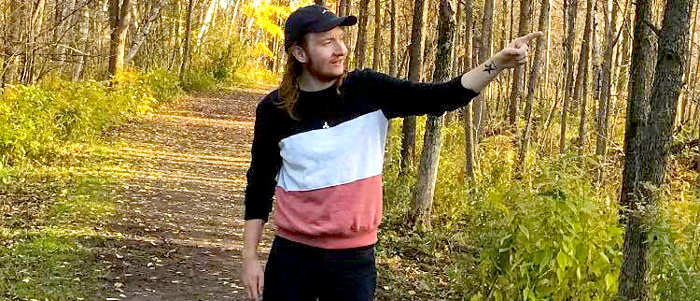
Garrett Ryan in Northern Ontario
AMPD: The idea of “getting out” of small towns is a prevalent feeling among artists who grew up in them, and who end up working in big cities. Why do you think that is?
GR: While I do appreciate how interconnected smaller cities are, it can feel quite suffocating growing up in that environment. We all make stupid mistakes or find ourselves in uncomfortable situations growing up. There were so many times where I wanted the freedom to be a stupid kid or experiment with different identities in public settings and was stopped by friendly waves or exclamations of “weren’t you the kid from that musical?!” It was mostly not malicious, although there were occurrences of that too, but it can feel like you’re drowning in a sea of people you are acquainted with. This problem was only exacerbated by my classmates getting jobs and working at every store I could think of going to for some peace and quiet. And as much as I was able to grow as a theatre maker in the North through participation in local theatre festivals and mentoring from some of the finest artists I have ever known, there’s only so many times you can present work to an audience consisting of the same incredibly supportive people before the drive to bring your work to a bigger area overtakes you.
When I moved to Toronto, I felt as though I was ready to begin the next stage of my career as a playwright and shed my small city identity in order to assimilate with theatre movements occurring in the big city. What I found however, was that I had become more interested in the area that had formed me than I ever had been while I was living there. I suppose it has something to do with seeing things from a different perspective, and I am not alone within the group of friends I grew up with. One of my closest friends is a painter from Timmins, another small city in Northeastern Ontario, and we rediscovered the Northern influence on our respective artforms almost in tandem after moving away from our hometowns. We both fantasized about the lights and sounds of the big city, but discovered we missed the cozy atmosphere and fresh air of the North. Maybe it is the idea of the grass always being greener on the other side. Although, it was also in this period after my graduation from high school and settlement into Southern Ontarian life when I became more aware of many of the aforementioned problems that were occurring in Northern Ontario. It was these two factors, alongside encouragement from [Playwriting Professor] Judith Rudikoff, that drew me to exploring more stories within the North. And with this exploring, I began to realize how many stories I had accumulated inside my head while growing up that I had to tell. Every place I had been and every person I had met in Northern Ontario had left a mark on me, negatively or positively, and I have found so much inspiration in it all. The allure to me is really that mix of beauty and hardships, and my own personal mix of dreamy nostalgia and sour memories.
I don’t know if I want to label myself as a “Northern Ontarian” playwright in any other sense aside from my place of birth, because I definitely have other stories I would like to tell outside of the confines of the North, but I currently have many Northern Ontarian stories I am excited to write and my Northeastern Ontarian upbringing will definitely always have an impact on my work.
AMPD: Television shows like Letterkenny have brought the “small-town Ontario life” to a wider audience, why is it important to tell more kinds of Canadian stories set outside of the GTA?
GR: It is funny that you brought up Letterkenny, because it was actually filmed in and around the area in which I grew up, and I know many people who worked on the show. Shows like Letterkenny mean a lot to me because I truly believe in representation for each and every version of Canada that exists. While the Canada of the GTA – and often only certain parts of the GTA – is valid, it is only a fraction of the multitude of experiences within this vast country. Being able to see art that represents who you are and where you come from is a powerful thing. It is also an incredible way of learning and teaching. I have learned so much more from watching and reading theatre about various pockets of Canada than I have ever learned from reading non-fiction texts on the same subjects. It is like being placed in the middle of stories that one would otherwise never witness themselves. I hope I can join the multitude of Ontarian artists telling these stories outside of the traditionally theatricalized Ontario in order to welcome people into the culture I grew up in, in the same way I have felt welcomed into so many other different Canadas in the theatre.
However, aside from the importance of allowing others to understand the existence of experiences in Ontario outside the GTA, these stories can also serve as a method of highlighting prevalent issues that are rarely discussed outside of the places in which they occur. In the Northern Ontarian context, employment has been steadily decreasing and the drug and violent crimes issues have been steadily climbing. Downtown North Bay was a place I would have felt comfortable being alone in as a young child, and it had gotten to the point where I was reluctant to visit after dark as a grown man. In our local newspaper, the scenes in downtown North Bay were recently described by a local business owner as being comparable to The Walking Dead. And with much of the Northern Ontarian industry becoming less and less profitable, these issues will keep increasing until the Southern Ontarian dominated government intervenes. When you factor in the amount of issues surrounding xenophobia and the struggle of the local LGBTQ+ communities, there are a wealth of problems that will keep getting worse until they are seriously addressed. As much as I adore telling stories about the parts of my childhood that positively shaped me, I do also feel a responsibility as a Northern Ontarian writer to help bring these issues to a wider audience with the hope of bringing about positive change, because while it is nice to simply see your community represented on stage, it is also the most effective way to make an audience both understand societal issues and feel compelled to address them.
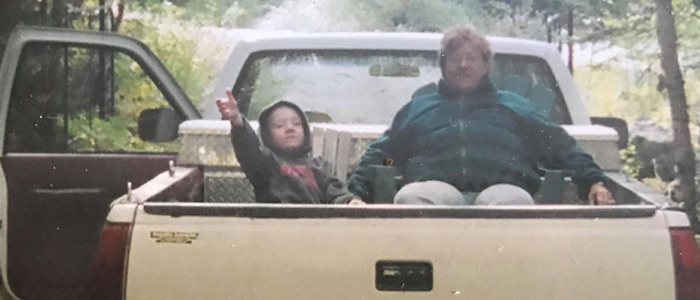
Garrett Ryan as a child in Northern Ontario
AMPD: Have you always had a passion for writing?
GR: My family can attest to the fact that I was always a storyteller. I was the kid who would make stories with the Lego minifigures rather than build the sets. My piles of stuffed animals were cast members on standby. It wasn’t until I was encouraged to act in our local musical theatre productions as a child that I began to discover my love for writing in a theatrical context. During high school, I wrote as much as I possibly could and was fortunate enough to have had my work performed in both Northern Ontarian fringe festivals and the International Thespian Festival in Nebraska. I had initially accepted an offer to study international relations in Ottawa but made the switch to study theatre due to the opportunities I was fortunate enough to have had and through encouragement from theatre makers in my hometown. When I moved to Toronto and began attending York, I knew I wanted to go all in on playwriting.
AMPD: Do you see any growth in yourself as an artist since your first year? How has studying Playwriting contributed to that?
GR: The openness of York’s theatre department is what I have found to be the most special about the program. While the department strives to create well rounded and well-trained theatre professionals, it does not do so with a cookie cutter mould. This is especially true of the playwriting stream. Coming in, I found myself worried about whether or not my voice would be “right” for the program. However, Judith’s goal is never to erase the voice of a writer, but instead to help them unearth and hone it. In one of the first exercises we did in class, I wrote a fragmented series of statements about a man describing the beauty of his dried-up mining town in the North, and was encouraged to continue exploring these themes. Since then, I have combined my passion for Northern Ontarian stories with my interests in topics such as religion, isolation, and abuse in order to find my authentic voice as a playwright. I have also been able to explore writing pieces in French and Irish, even performing a monodrama partially in Irish during our Red / White Project performance last winter, which is something I never imagined I would have the freedom to do within this program. As an artist, York and the playwriting stream have given me the opportunity to understand my own voice and the stories I wish to tell in a way I never knew I could before.
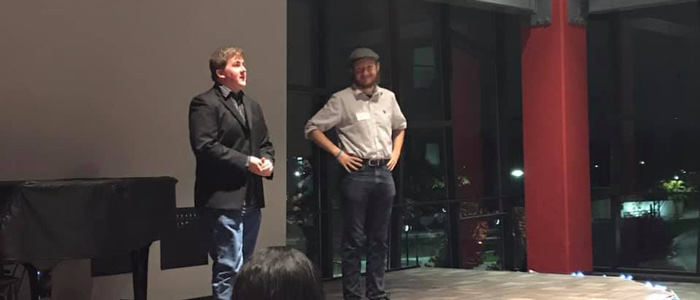
Garrett Ryan (Right) with fellow 4th year playwright Connor Williamson
AMPD: What are your aspirations after York?
GR: In a few months, when I graduate from my final year at York, I hope to continue on to a graduate program in performance studies and advance my career as a theatre maker while building up my production company inside and outside of Northern Ontario. In five years, I hope to be well on my way to a career in performance academia with a more active production company. In ten years, I hope to be in a position where I am able to give back to the community that fostered me as an artist. There are so many incredible English, Franco-Ontarian, and Indigenous voices from Northern Ontario with stories that deserve to be heard, yet struggle to do so. With any sort of success in the industry, I will work as much as possible with other incredible Northern Ontarian theatre makers in order to elevate these artists and help grow the local theatre communities into the artistic hubs they are slowly becoming.
AMPD: Any advice for a first-year theatre student?
GR: As a relatively shy person, I have always struggled greatly with fitting into the typically extremely extroverted theatre community, which greatly affected both my confidence in my work and my ability to forge professional relationships. The most important advice I can give for theatre students such as myself, who consider themselves to be more introverted, is to get involved in anything and everything – which I understand is easier said than done. In my first year at York, I felt unsure about my skill level as an artist and my ability to fit into social circles that had begun forming almost immediately. Because of this social anxiety, I certainly missed out on opportunities I could have had by putting myself out there. Once I finally convinced myself to get involved as much as possible, I started realizing that both relationships with fellow students and artistic confidence could only come from participating in the program to the fullest extent possible.
A theatre degree is different from other degrees in that it is what you make of it. Drifting through the program with bare minimum grades and minimal practical experience is easy but will not take you anywhere meaningful. Take a leap of faith and let your voice be heard, from speaking up in classes to volunteering for any opportunities that arise. Once I started to participate in playGround [a student run theatre festival at York] and other events within the department, I started feeling like a real member of the theatre community at York and discovered despite being a more reserved person than many other students, we could all bond together over our shared love of the artform.
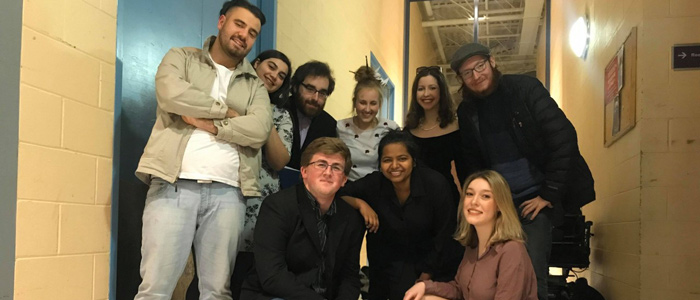
Garrett Ryan (top right) with cast and crew for “Off the Ground”, which premiered in York’s playGround Festival
CLICK HERE to watch The Ashley Plays @ Home, 2020

